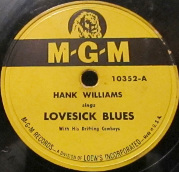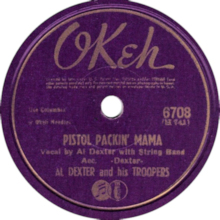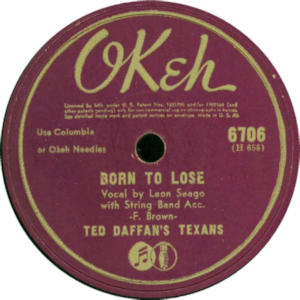Related Research Articles

"In the Mood" is a popular big band-era jazz standard recorded by American bandleader Glenn Miller. "In the Mood" is based on the composition "Tar Paper Stomp" by Wingy Manone. The first recording under the name "In the Mood" was released by Edgar Hayes & His Orchestra in 1938.

Clarence Albert Poindexter, known as Al Dexter, was an American country musician and songwriter. He is best known for "Pistol Packin' Mama," a 1943 hit that was one of the most popular recordings of the World War II years and later became a hit again with a cover by Bing Crosby and The Andrews Sisters.
"You Are My Sunshine" is a song published by Jimmie Davis and Charles Mitchell in 1940. According to Broadcast Music, Inc. (BMI), the song has been recorded by over 350 artists and translated into 30 languages.
"Half as Much" is an American pop standard song written by Curley Williams in 1951. It was first recorded by country music singer Hank Williams in 1952 and reached number two on the Billboard Country Singles chart.

"Hey, Good Lookin'" is a 1951 song written and recorded by Hank Williams, and his version was inducted into the Grammy Hall of Fame in 2001. In 2003, CMT voted the Hank Williams version No. 19 on CMT's 100 Greatest Songs of Country Music. Since its original 1951 recording it has been covered by a variety of artists.

"Lovesick Blues" is a Tin Pan Alley song, composed by Cliff Friend, with lyrics by Irving Mills. It first appeared in the 1922 musical "Oh, Ernest", and was recorded that year by Elsie Clark and Jack Shea. Emmett Miller recorded it in 1925 and 1928, followed by country music singer Rex Griffin in 1939. The recordings by Griffin and Miller inspired Hank Williams to perform the song during his first appearances on the Louisiana Hayride radio show in 1948. Receiving an enthusiastic reception from the audience, Williams decided to record his own version despite initial push back from his producer Fred Rose and his band.
This is a list of notable events in country music that took place in the year 1943.
"There! I've Said It Again" is a popular song written and published by Redd Evans and David Mann in 1941. In early 1945, Vaughn Monroe and his Orchestra released Victor 20-1637, which reached the number one position on the Billboard's National Radio Airplay chart for five straight weeks, then no.2 for six more weeks, and a total run of 29 weeks. It finished 1945 as the no. 4 record of the year.
"Take Me Back to Tulsa" is a Western swing standard song. Bob Wills and Tommy Duncan added words and music to the melody of the traditional fiddle tune "Walkin' Georgia Rose" in 1940. The song is one of eight country music performances selected for the Rock and Roll Hall of Fame's "500 Songs That Shaped Rock & Roll".

"Pistol Packin' Mama" was a "Hillbilly"-Honky Tonk record released at the height of World War II that became a nationwide sensation, and the first "Country" song to top the Billboard popular music chart. It was written by Al Dexter of Troup, Texas, who recorded it in Los Angeles, California on March 20, 1942, with top session musicians Dick Roberts, Johnny Bond and Dick Reinhart, who all normally worked for Gene Autry).
"Rosalita" is a 1942 song performed by Al Dexter and His Troopers. It was recorded on March 18, 1942 at the CBS Studio at Radio Station KNX, Sunset Blvd., Hollywood, California with session musicians Frank Marvin, Johnny Bond and Dick Reinhart. It was released on Okeh Records #6708 in March 1943, paired with "Pistol Packin' Mama". After the "Most Played Jukebox Folk Records" chart was established on January 8, 1944., it remained for six months, peaking at #1 on March 11, 1944.
"Too Late to Worry, Too Blue to Cry" is a 1942 song by Al Dexter. It was recorded on March 18, 1942 at the CBS Studio at Radio Station KNX, Sunset Blvd., Hollywood, California with session musicians Frank Marvin, Johnny Bond and Dick Reinhart. It was released on Okeh records #6718 on February 6, 1944, paired with "So Long Pal". It went to number one on the Folk Juke Box charts for two weeks and stayed on the charts for a total of thirty weeks.
"Among My Souvenirs" is a 1927 song with words by Edgar Leslie and music by Horatio Nicholls.
"I'm Losing My Mind Over You" is a 1945 song by Al Dexter and His Troopers. The song was Al Dexter's fifth release as well as his fifth number one on the Folk/Juke Box charts. The B-side of the song, entitled, "I'll Wait For You Dear" peaked at number two on the same chart.
"Guitar Polka" is a 1946 instrumental song by Al Dexter and His Troopers. "Guitar Polka" spent sixteen weeks at number one on the Juke Box Folk charts and a total of twenty-nine weeks on the chart.
"Wine Women And Song" is a 1940 song written by Al Dexter and Aubrey Gass. It was recorded on April 23, 1940 at Burrus Sawmill Studio, Saginaw, Texas by Al Dexter & His Troopers. It was released June 6, 1940 on Vocalion 05572 with no success. After hits like "Pistol Packin' Mama", Dexter re-recorded it on April 5, 1945 at the CBS Studio at Radio Station KNX, Sunset Blvd., Hollywood, California. It was released on August 15, 1946 on Columbia 37062, backed with "It's Up To You". On September 14, 1946, it reached the no. 1 spot on Billboard's "Most Played Jukebox Folk Records" chart, where it remained for five weeks.
"You Win Again" is a 1952 song by Hank Williams. In style, the song is a blues ballad and deals with the singer's despair with his partner. The song has been widely covered, including versions by Ray Charles, Jerry Lee Lewis, Roy Orbison, the Grateful Dead, Charley Pride, Bob Dylan, and the Rolling Stones.
"Honey, Do You Think I'm Wrong" is a country music song written by Al Dexter and Frankie Marvin, performed by Al Dexter and His Troopers, and released on the Columbia label. In February 1946, it reached No. 2 on the folk chart. It spent eight weeks on the charts and was ranked as the No. 12 record in Billboard's year-end folk juke box chart. It was the "B-side" to "Guitar Polka" which peaked at No. 1.

"Born to Lose" is a song written by Ted Daffan. Recorded by his band Ted Daffan's Texans, with vocal by Leon Seago, on February 20, 1942, it was released on shellac in early 1943.
References
- ↑ Library of Congress. Copyright Office. (1942). Catalog of Copyright Entries 1942 1 Music New Series Vol 37 Pt 3. United States Copyright Office. U.S. Govt. Print. Off.
- ↑ "Al Dexter". countrydiscoghraphy2.blogspot.com. Retrieved 16 July 2021.
- ↑ Russell, Tony (2004). Country Music Records: A Discography, 1921-1942. New York: Oxford University Press. p. 315. ISBN 0195139895.
- ↑ "Billboard-1944-09-23 YB pg 366". google books. 1944. Retrieved 16 July 2021.
- ↑ Whitburn, Joel (2004). The Billboard Book Of Top 40 Country Hits: 1944-2006, Second edition. Record Research. p. 104.